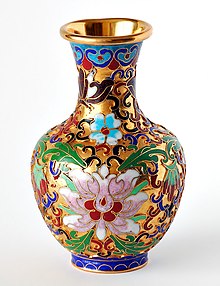vaso
Jump to navigation
Jump to search
Finnish
[edit]Verb
[edit]vaso
- inflection of vasoa:
Anagrams
[edit]Galician
[edit]Etymology
[edit]From Old Galician-Portuguese vaso, from Latin vāsum.
Pronunciation
[edit]Noun
[edit]vaso m (plural vasos)
- drinking glass
- glassful
- drinking vessel
- 1325, E. Portela Silva, editor, La región del obispado de Tuy en los siglos XII a XV. Una sociedad en expansión y en la crisis, Santiago: El Eco Franciscano, page 396:
- Et mando y conmigo a esse moesteyro a minna cama que eu ouver a ora da minna morte e huun vaso de prata de huun marco ou huna taça
- And I bequeath to this monastery my bed, the one I happen to have at the time of my death, and a silver goblet, weighting a mark, and a cup
- vase; urn
- (of a horse) hoof
References
[edit]- Ernesto Xosé González Seoane, María Álvarez de la Granja, Ana Isabel Boullón Agrelo (2006–2022) “vaso”, in Dicionario de Dicionarios do galego medieval (in Galician), Santiago de Compostela: Instituto da Lingua Galega
- Xavier Varela Barreiro, Xavier Gómez Guinovart (2006–2018) “vaso”, in Corpus Xelmírez - Corpus lingüístico da Galicia medieval (in Galician), Santiago de Compostela: ILG
- Antón Luís Santamarina Fernández, editor (2006–2013), “vaso”, in Dicionario de Dicionarios da lingua galega [Dictionary of Dictionaries of the Galician language] (in Galician), Santiago de Compostela: Instituto da Lingua Galega
- Antón Luís Santamarina Fernández, Ernesto Xosé González Seoane, María Álvarez de la Granja, editors (2003–2018), “vaso”, in Tesouro informatizado da lingua galega (in Galician), Santiago de Compostela: Instituto da Lingua Galega
- Rosario Álvarez Blanco, editor (2014–2024), “vaso”, in Tesouro do léxico patrimonial galego e portugués (in Galician), Santiago de Compostela: Instituto da Lingua Galega, →ISSN
Italian
[edit]
Etymology
[edit]Pronunciation
[edit]Noun
[edit]vaso m (plural vasi, diminutive vasétto or vasettìno or (familiar, used in reference to babies) vasìno, augmentative vasóne, derogatory vasùccio)
Derived terms
[edit]Related terms
[edit]Descendants
[edit]Further reading
[edit]- vaso in Treccani.it – Vocabolario Treccani on line, Istituto dell'Enciclopedia Italiana
Latin
[edit]Noun
[edit]vāsō
References
[edit]- vaso in Charles du Fresne du Cange’s Glossarium Mediæ et Infimæ Latinitatis (augmented edition with additions by D. P. Carpenterius, Adelungius and others, edited by Léopold Favre, 1883–1887)
Neapolitan
[edit]Etymology
[edit]Inherited from Latin bāsium. Compare Italian bacio.
Pronunciation
[edit]Noun
[edit]vaso m (plural vase)
References
[edit]- AIS: Sprach- und Sachatlas Italiens und der Südschweiz [Linguistic and Ethnographic Atlas of Italy and Southern Switzerland] – map 68: “il bacio” – on navigais-web.pd.istc.cnr.it
Portuguese
[edit]Alternative forms
[edit]Etymology
[edit]From Old Galician-Portuguese vaso, from Latin vāsum (“vessel; vase”).
Pronunciation
[edit]
Noun
[edit]vaso m (plural vasos)
- vessel (container of liquid)
- vase (container for flowers)
- (biology) vessel (tube or canal that carries fluid)
- (Brazil) toilet (device for depositing human waste and then flushing it)
Hyponyms
[edit]- (container of liquid): ânfora, cântaro
- (tube or canal that carries fluid): artéria, capilar, traqueia, veia
Derived terms
[edit]Descendants
[edit]Spanish
[edit]Etymology
[edit]Inherited from Old Spanish vaso, from Latin vāsum, from vās.
Pronunciation
[edit]- IPA(key): /ˈbaso/ [ˈba.so]
Audio (Colombia): (file) - Rhymes: -aso
- Syllabification: va‧so
- Homophones: baso, (Latin America) bazo
Noun
[edit]vaso m (plural vasos)
- drinking glass
- Synonym: copa
- glassful
- vessel (container)
- vessel (tube or canal that carries fluid in an animal or plant)
Usage notes
[edit]- Vaso is a false friend, and does not mean vase. The Spanish word for vase is jarrón. However, vaso's Latin ancestor, vāsum, meant "vase."
Derived terms
[edit](diminutive vasito)
Related terms
[edit]Descendants
[edit]- → Basque: baso
- → Hiligaynon: baso
- → Kapampangan: basu
- → Karao: baso
- → Maguindanao: basu
- → Tagalog: baso
Further reading
[edit]- “vaso”, in Diccionario de la lengua española, Vigésima tercera edición, Real Academia Española, 2014
Categories:
- Finnish non-lemma forms
- Finnish verb forms
- Galician terms inherited from Old Galician-Portuguese
- Galician terms derived from Old Galician-Portuguese
- Galician terms inherited from Latin
- Galician terms derived from Latin
- Galician terms with IPA pronunciation
- Galician lemmas
- Galician nouns
- Galician countable nouns
- Galician masculine nouns
- Galician terms with quotations
- Italian terms inherited from Latin
- Italian terms derived from Latin
- Italian 2-syllable words
- Italian terms with IPA pronunciation
- Rhymes:Italian/azo
- Rhymes:Italian/azo/2 syllables
- Italian terms with audio links
- Italian lemmas
- Italian nouns
- Italian countable nouns
- Italian masculine nouns
- it:Containers
- Latin non-lemma forms
- Latin noun forms
- Neapolitan terms inherited from Latin
- Neapolitan terms derived from Latin
- Neapolitan terms with IPA pronunciation
- Neapolitan lemmas
- Neapolitan nouns
- Neapolitan masculine nouns
- Portuguese terms inherited from Old Galician-Portuguese
- Portuguese terms derived from Old Galician-Portuguese
- Portuguese terms inherited from Latin
- Portuguese terms derived from Latin
- Portuguese 2-syllable words
- Portuguese terms with IPA pronunciation
- Portuguese terms with homophones
- Rhymes:Portuguese/azu
- Rhymes:Portuguese/azu/2 syllables
- Portuguese lemmas
- Portuguese nouns
- Portuguese countable nouns
- Portuguese masculine nouns
- pt:Biology
- Brazilian Portuguese
- pt:Containers
- Spanish terms inherited from Old Spanish
- Spanish terms derived from Old Spanish
- Spanish terms inherited from Latin
- Spanish terms derived from Latin
- Spanish 2-syllable words
- Spanish terms with IPA pronunciation
- Spanish terms with audio links
- Rhymes:Spanish/aso
- Rhymes:Spanish/aso/2 syllables
- Spanish terms with homophones
- Spanish lemmas
- Spanish nouns
- Spanish countable nouns
- Spanish masculine nouns
- es:Containers
